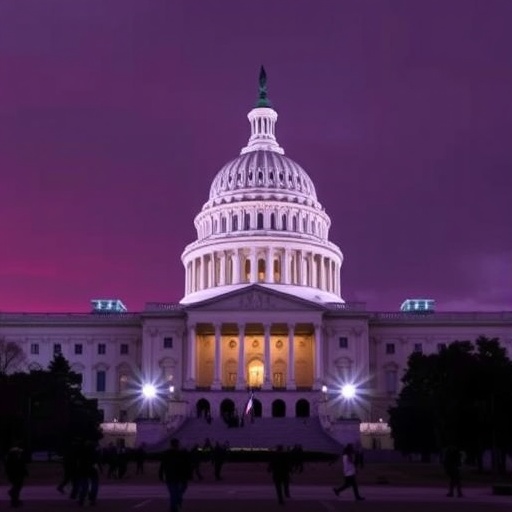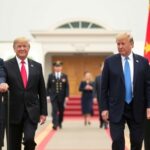U.S. Government shutdown Reaches 21 Days: Partisan Deadlock in Congress Devastates Federal Workers and Services
As the federal Government shutdown stretches into its 21st day, millions of Americans are feeling the pinch of a bitter partisan standoff in Congress that shows no signs of resolution. What began as a routine funding dispute has ballooned into a national crisis, furloughing over 800,000 federal workers and halting essential services from national parks to air traffic control. The deadlock between Republicans and Democrats over border security funding has left the economy reeling, with estimates now pegging daily losses at $160 million.
- Federal Workers on the Brink: Stories of Financial Hardship Emerge
- Partisan Fault Lines Deepen: Republicans Demand Border Wall Funds, Democrats Push Back
- Services Grind to a Halt: National Parks Close, Flights Delayed Nationwide
- Escalating Economic Fallout: Billions Lost as Shutdown Prolongs
- Path Forward Uncertain: Bipartisan Breakthrough Elusive Amid Rising Pressure
This prolonged Government shutdown is not just a Washington D.C. headache—it’s disrupting lives across the country. From Smithsonian museums shuttered to veterans waiting for benefits, the human cost is mounting. Senate Majority Leader Chuck Schumer (D-NY) accused Republicans of ‘holding the American people hostage’ in a fiery floor speech yesterday, while House Speaker Mike Johnson (R-LA) countered that Democrats are ignoring national security imperatives. With midterms looming and public frustration boiling over, the question remains: how much longer can this impasse last?
Federal Workers on the Brink: Stories of Financial Hardship Emerge
For federal workers caught in the crossfire of this government shutdown, the reality is grim. Over 800,000 non-essential employees have been furloughed without pay, joining the ranks of the unemployed in an already fragile job market. Essential workers, numbering around 1.4 million, continue to report for duty but face delayed paychecks, adding to their anxiety.
Take Sarah Jenkins, a 42-year-old IRS auditor from Virginia, who has been furloughed since the shutdown began three weeks ago. ‘I’ve dipped into my savings to cover mortgage payments and groceries,’ Jenkins told reporters outside the Capitol. ‘My kids don’t understand why we can’t go out to dinner anymore. This isn’t just politics—it’s our livelihood.’ Her story echoes thousands of others, as federal employees scramble to make ends meet. According to the Partnership for Public Service, a nonprofit advocacy group, furloughed workers could lose up to $10,000 in wages by the end of the month if the shutdown persists.
The ripple effects extend beyond direct paychecks. Spouses and families of federal workers are deferring medical bills and cutting back on essentials. In a survey by the National Treasury Employees Union, 70% of respondents reported dipping into emergency funds, while 25% considered taking out loans. Veterans, who make up a significant portion of federal staff, are particularly vulnerable; the Department of Veterans Affairs has furloughed 10,000 employees, delaying claims processing for benefits that many rely on for survival.
Economists warn that this financial strain could exacerbate broader economic woes. The Congressional Budget Office estimates that the shutdown has already shaved 0.1% off GDP growth in the first quarter, with consumer spending dropping as federal workers tighten belts. Small businesses near federal installations, from D.C. delis to park concession stands, are seeing revenues plummet by 30-50%, according to the U.S. Chamber of Commerce.
Partisan Fault Lines Deepen: Republicans Demand Border Wall Funds, Democrats Push Back
At the heart of this government shutdown lies a classic clash in Congress: Republicans insisting on $5 billion for border wall construction as a non-negotiable condition for funding, while Democrats view it as wasteful spending amid pressing domestic needs. House Republicans, led by Speaker Johnson, have repeatedly blocked short-term funding bills without wall allocations, framing it as a fulfillment of campaign promises on immigration.
‘The American people voted for secure borders,’ Johnson declared in a press conference last week. ‘Democrats’ refusal to compromise is endangering our nation.’ On the other side, Senate Democrats, bolstered by incoming President-elect’s influence, argue that the wall is an ineffective symbol that diverts funds from real security measures like technology and personnel. ‘We’re not going to fund a medieval solution in the 21st century,’ said Sen. Elizabeth Warren (D-MA) during a CNN interview. ‘Republicans are using this shutdown to play politics with people’s lives.’
The deadlock has historical precedents— the 2018-2019 shutdown lasted 35 days over similar issues—but this iteration feels more entrenched. Bipartisan talks mediated by Senate Minority Leader Mitch McConnell (R-KY) collapsed Tuesday when Democrats rejected a compromise offering $2 billion for barriers in exchange for disaster relief funding. Sources inside the negotiations reveal that personal animosities are at play; leaked emails show heated exchanges between key staffers, with one Republican aide calling Democratic proposals ‘a slap in the face to border agents.’
Public opinion polls reflect the divide. A recent Gallup survey shows 52% of Americans blame Republicans for the shutdown, up from 45% last week, while 40% point to Democrats. Among independents, frustration is highest, with 65% calling for immediate compromise. Immigration remains a flashpoint: Pew Research indicates that 60% of Republicans support wall funding, compared to just 15% of Democrats, underscoring the partisan chasm.
Services Grind to a Halt: National Parks Close, Flights Delayed Nationwide
The government shutdown‘s tentacles reach far beyond Capitol Hill, crippling federal services that Americans take for granted. National parks, monuments, and museums under the Department of the Interior have been forced to close or operate at skeleton crews, turning away millions of visitors during the holiday season. Yosemite National Park, for instance, has shuttered its gates, leaving rangers unpaid and trails unmaintained—a safety risk amid winter storms.
‘Families planned year-long trips, only to find ‘Closed Due to Shutdown’ signs,’ said National Park Service volunteer Maria Lopez in a statement to The Associated Press. Over 21,000 park service employees are affected, with 7,000 furloughed. The economic hit to gateway communities is severe; a study by the Outdoor Industry Association projects $500 million in lost tourism revenue by month’s end.
Transportation hasn’t escaped unscathed. The Federal Aviation Administration reports delays at major airports due to furloughed safety inspectors and air traffic controllers working overtime without pay. At Reagan National Airport, flights were grounded for hours last Friday after a controller called in sick, citing exhaustion. The Transportation Security Administration (TSA) has seen ‘sick-outs’ among screeners, leading to longer lines and missed connections for holiday travelers.
Other agencies feel the strain too. The Environmental Protection Agency has halted routine inspections, potentially allowing polluters to operate unchecked. Food and Drug Administration reviews for new drugs have slowed, delaying treatments for patients. Even the U.S. Postal Service, though not directly federal, faces indirect impacts as federal grants for rural delivery dry up. In total, 40% of federal operations are curtailed, per a White House briefing, affecting everything from wildlife refuges to federal court proceedings.
Escalating Economic Fallout: Billions Lost as Shutdown Prolongs
The financial hemorrhage from this government shutdown is staggering, with the total cost now exceeding $3.4 billion after 21 days. Moody’s Analytics forecasts that a full month could cost the economy $18 billion, including lost wages, reduced productivity, and deferred maintenance on federal infrastructure. Stock markets have dipped 2% since the shutdown began, with investor confidence shaken by the uncertainty.
Federal workers aren’t the only victims; contractors and vendors supplying the government are owed billions in back payments. Boeing, for example, has halted work on defense projects, idling 1,500 employees. Small businesses, which make up 25% of federal contracts, are at risk of bankruptcy; the Small Business Administration reports a 40% surge in loan applications from affected firms.
Consumer confidence indices have plummeted, with the Conference Board’s measure dropping 5 points in December. Retail sales forecasts for the holiday season are revised downward by 1.5%, as furloughed families cut discretionary spending. Food banks in D.C. and other federal hubs report a 30% increase in demand, highlighting the growing inequality exacerbated by the crisis.
Internationally, the shutdown undermines U.S. credibility. Foreign leaders, from EU counterparts to Chinese officials, have questioned America’s stability, potentially weakening trade negotiations. The State Department, with 75% of staff furloughed, has paused visa processing, stranding tourists and business travelers abroad.
Path Forward Uncertain: Bipartisan Breakthrough Elusive Amid Rising Pressure
As the government shutdown enters uncharted territory, pressure mounts on Congress from all sides. President Biden has threatened to veto any funding bill without comprehensive immigration reform, while Republicans in the House vow to hold the line until Democrats concede. A group of moderate senators from both parties proposed a ‘clean’ funding bill yesterday, but it failed a procedural vote 48-52, with only three Republicans crossing the aisle.
Experts predict the standoff could drag into January, overlapping with the new Congress’s swearing-in. ‘This isn’t just about funding—it’s a preview of legislative gridlock ahead,’ said Brookings Institution analyst Sarah Bindler. If unresolved, back pay for federal workers is guaranteed by law, but the psychological toll and service disruptions could linger for months.
Looking ahead, potential catalysts include public protests planned for this weekend in major cities and a Supreme Court challenge from unions representing furloughed staff. International lenders like the IMF have urged swift resolution to avert global ripple effects. For now, families like the Jenkinses hold their breath, hoping that partisan pride doesn’t cost them their futures. The clock is ticking, and with each passing day, the divide in Congress between Republicans and Democrats only widens.








